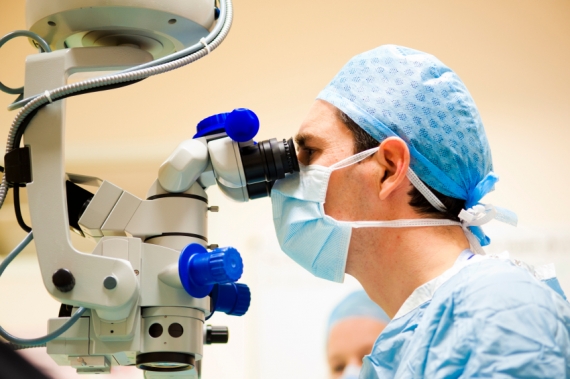Cataract Specialist in Fort Myers
If you live or work in Fort Myers and are looking for a specialist to answer your questions about cataracts and cataract surgery, the team at Elmquist Eye Group can help put your mind at ease.
Dr. E. Trevor Elmquist, one of America’s Top Doctors in ophthalmology, his partner, Kate Wagner, OD, and his associate, Nina Burt, OD, provide complete eye care services. Dr. Elmquist is a skilled, board certified ophthalmologist, and Drs. Wagner and Burt are board certified optometrists. With state-of-the-art facilities, we offer a wide variety of services, from routine eye exams for glasses to bladeless laser-assisted cataract surgery.
 Cataracts are a clouding of the normally clear lens of the eye. As we age, the lens may naturally harden and become cloudy, blocking light from reaching the retina and interfering with our vision. The effect is similar to looking through a dirty car windshield.
Cataracts are a clouding of the normally clear lens of the eye. As we age, the lens may naturally harden and become cloudy, blocking light from reaching the retina and interfering with our vision. The effect is similar to looking through a dirty car windshield.
Cataracts can occur at any age, but are a very common part of the natural aging process. An estimated 24.5 million Americans aged 40 years and older have a cataract in one or both eyes. Cataracts worsen slowly over time, but cataract surgery can correct the problem.
Cataract Treatment
Cataracts are treated by surgically removing the cloudy natural lens and replacing it with a clear artificial lens, called an intraocular lens or IOL. Unlike a contact lens, it is placed permanently inside the eye. It cannot fall out, does not require cleaning, and you will not even notice that it’s there.
Although all surgeries have risks, cataract surgery is one of the safest surgeries performed in the U.S. today. And Elmquist Eye Group now offers bladeless laser-assisted cataract surgery which is designed to make the procedure even more precise, safe and accurate.
Whether or not you will need glasses after cataract surgery depends on the type of intraocular lens that is implanted.
Types of Lenses
Today, there are several options when it comes to intraocular lenses. Your eye doctor will help you decide which lenses may be right for you. The four main types are:
- Monofocal–A monofocal lens is a one-distance lens. It is the most basic of the available IOLs and is covered by Medicare and most health insurance plans. With a monofocal lens, you may be able to drive without needing glasses, but most people require glasses for distance, intermediate and near vision, such as for working on a computer or reading a book.
- Multifocal–If being less dependent on glasses is one of your goals, consider multifocal lenses. These new-technology IOLs correct for all distances and give you good near and far vision. One drawback is that you may experience halos around lights when driving at night, but it diminishes over time and most patients are not significantly bothered by it.
- Toric– You may be a candidate for the Toric lens if you have astigmatism (an irregularly shaped cornea). Unlike eyeglasses, standard IOLs cannot correct astigmatism. For this reason, the more astigmatism you have, the more dependent you would be on eyeglasses even after cataract surgery.
- ReSTOR – Trevor Elmquist is proud to offer the newly FDA approved AcrySof® ReSTOR® IOL lens, which is designed to allow patients to see clearly at all distances without bifocals or reading glasses. In clinical studies, 80% of patients receiving this IOL reported that they never wear glasses for any activities. And 94% of patients said they would have the AcrySof® ReSTOR® IOL implanted again, if given the choice.
No single type of lens is best for every patient, and your surgeon’s experience with each of these lenses will play an important part in obtaining the right lens for your eyes.
Dr. Elmquist will do additional testing before surgery and, with input from you about your lifestyle and preferences, will help you determine the appropriate IOL for your unique eyes.
Dr. Trevor Elmquist, the cataract specialist at Elmquist Eye Group in Fort Myers and Cape Coral, can help you achieve the best possible visual results from your cataract surgery. Call us today at (239) 936-2020 to schedule an appointment and get started.
